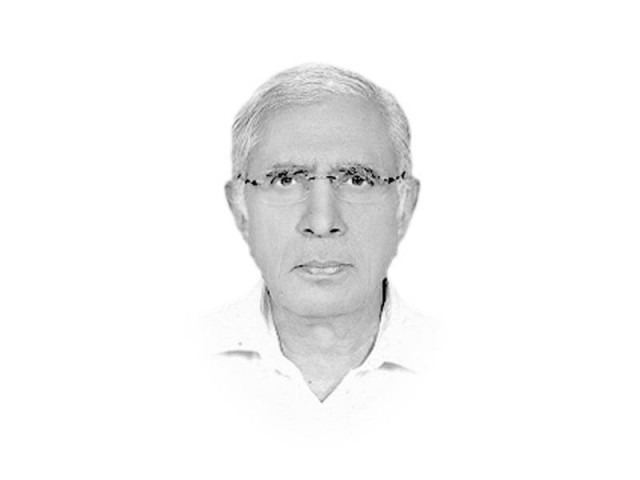War for peace
The delay in launching this war for peace has also injected a large dose of trust deficit with other states

The writer is the Executive Editor of The Express Tribune
There are two non-official ‘official’ explanations why we delayed this war for peace for such a long time. On the face of it, both the explanations sound logical but appear not so when assessed against the consequences of the aftermath.
One explanation was offered, during a talk at a seminar on November 26, 2013, by General (retd) Ehsan, former chairman of the joint chiefs of staff committee, who was the chief of the ISI when our non-state actors (NSAs) turned against the state for abandoning the strategic depth- in-Afghanistan project as well as the mission to ‘liberate’ Indian held Kashmir. The other explanation was advanced by the recently-retired ISI chief, Lt General (retd) Shuja Pasha, during a briefing he gave to an in-camera session of a joint sitting of parliament on May 13, 2011.
Ehsan’s explanation: Pakistan had the choice to go after these non-state actors immediately or dismantle their infrastructure gradually. He said the first option was considered too dangerous as the militants, it was feared, would morph into many groups once their leadership was arrested and jailed, making it impossible to monitor the splinters. So, the second option was adopted. This, he said, was based on the theory that if one tried to jump from the top of the ladder, there was this possibility of ending up with broken limbs. It was therefore decided, he said, to climb down the ladder one step at a time.
Pasha’s explanation: There are about 3,500 foreigners in North Waziristan, about a few scores of Arabs, a thousand or so children of Arabs from Pashtun mothers, some tourist jihadists, and a sprinkling of Uzbeks, Tajiks, Chechens and Uyghurs.
If we tried to send boots into the region, the NSAs would use the civilian population as a human shield resulting in colossal collateral damage. If we bomb them from skies, the collateral damage would be as enormous. Using gunship helicopters would be disastrous because the terrorists would shoot them down.
Ehsan’s gradualism theory seems to have done us no good. We seem to have lost a lot of limbs already. We have lost as many as 53, 000 Pakistanis, including 7,000 security personnel, and suffered a massive dent of $120 billion to the economy. More importantly, we have lost a lot of ideological space to the distorted version of Islam propagated at gunpoint by these NSAs. This ideology has spread like wildfire from Fata to Punjab and Karachi and in the last year or two, to rural Sindh and Balochistan. As a result, at least two mainstream political parties — the PML-N and the PTI — and a part of the media seem to have been infected to a degree by this propaganda.
Both these parties and a large part of the media had maintained a criminal silence when just before the last general elections these NSAs dared the PPP, the ANP and the MQM to hold election rallies. A part of the media has also indulged in the glorification of the NSAs.
As a result, Pakistan has become a pariah state, almost. No country wants to play cricket here and our tourism has taken a big hit. Even our most secure establishments, like the GHQ and the naval and air force installations have come under attack. Only last week, our busiest airport and one of the main links to the outside world was taken over by 10 NSAs for almost five hours. The siege cost us as many as 30 lives.
And Pasha’s explanation appears more like a deception than a factual assessment when considered against the bold decision of Prime Minister Nawaz Sharif, of course on the advice of COAS General Raheel, to send boots into NW, strafe it from the skies and also use gunship helicopters in the campaign.
The inordinate delay in launching this war for peace has also injected a large dose of trust deficit between Islamabad and Washington, and two of our immediate neighbours — India and Afghanistan — continue to suspect our intentions and accuse us of playing a double game.
Published in The Express Tribune, June 18th, 2014.
Like Opinion & Editorial on Facebook, follow @ETOpEd on Twitter to receive all updates on all our daily pieces.















COMMENTS
Comments are moderated and generally will be posted if they are on-topic and not abusive.
For more information, please see our Comments FAQ